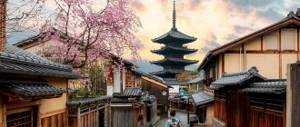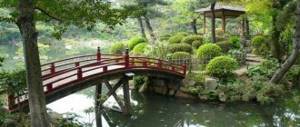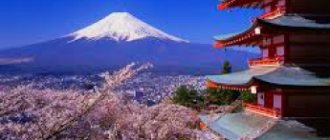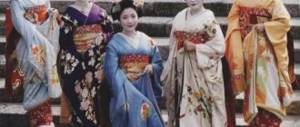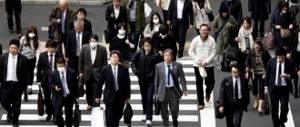Japan is one of the most exotic countries in the world, completely closed from Europeans until the mid-18th century. For more than 250 years, it has amazed and shocked foreigners who come here. In just a hundred years, the Land of the Rising Sun managed to conquer the world thanks to the latest technological developments and high quality goods. Having become acquainted with its culture and traditions, people are always divided into 2 camps: those who admire it and those who categorically reject it. There are practically no indifferent people. What then are the peculiarities of the life of Russian immigrants in this exotic Asian country?
Japan: the life of ordinary people and the peculiarities of the country
Climate and ecology
Japan can be roughly divided into 6 zones, the climate of which varies from temperate to subtropical in the southwestern islands. The island of Hokkaido is characterized by cool summers and long, frosty winters; the central highlands have a typical island climate with large temperature differences between night and day, winter and summer. The southwestern islands have warm winters, hot summers, and a pronounced rainy season.
There are more than 100 active volcanoes on the Japanese islands, and their number is gradually growing. Every year, more than 1.5 thousand earthquakes with a magnitude of 1 to 9 occur in Japan, and typhoons periodically sweep over the country, causing serious destruction.
Active volcanoes in Japan look majestic, but can pose a danger to the population
The country's ecology is a sore spot for the Japanese. In the middle of the last century, during a period of rapid industrial development, significant environmental pollution occurred, the consequences of which are still being eliminated. The situation is aggravated by the significant overpopulation of the archipelago. Today, the main problems of the Land of the Rising Sun are:
- urban air pollution;
- irreversible climate change;
- eutrophication of waters (excessive increase in the content of nutrients in water bodies), leading to a deterioration in their quality and active growth of algae;
- recycling.
Features of mentality
Throughout their entire adult lives, the Japanese have been learning to understand each other without words. Preferences are rarely expressed verbally, so in the Land of the Rising Sun everyone has to be a little telepathic. Here the hostess will not ask you which cuisine you prefer. When inviting guests to her place, she will prepare several dozen dishes for almost every taste.
The quintessence of mutual understanding is the Japanese word yoroshiku, which means roughly the following: “You understand what I want to do. I understand that you understand this. Therefore, I count on you to do what I wanted to do, in exactly the way I planned. And thank you for understanding me by taking the trouble to fulfill my desire.” It is very difficult for a European to grasp all the shades of yoroshiku, since in our culture it is customary to state one’s desires in detail and certainly insist on their fulfillment.
The Japanese have also mastered the art of pretending not to understand someone's question if they fear the answer might offend or upset them. In this case, residents of the Land of the Rising Sun try to shift the conversation to a more pleasant topic or get away with vague phrases. They prefer not to talk about things that could lead to a dispute at all.
In all areas of Japanese society, saving face is considered especially important. If a mistake is made, it must be publicly corrected. Any misconduct requires an official apology, especially for mistakes at work. After public repentance, the awkward situation is smoothed over, and the incident is forgotten. People stop asking awkward questions because the case is closed.
Europeans living in the Land of the Rising Sun are quickly adopting Japanese traditions. Bowing for any reason is one of them
Way of life
The day of an ordinary Japanese, like a citizen of any other country, is divided into 3 parts: work, family, personal affairs. The difference is how much time they take.
Many people consider the Japanese to be workaholics. This is true: the average resident of a metropolis spends at least 10 hours at work. If you add another 1.5–2 hours to travel to your office, it turns out that more than half a day is devoted to work every day. In addition, there are also obligatory gatherings in a cafe after work, corporate events that cannot be ignored, and joint trips to nature.
Family is very important for the Japanese, but the attitude towards it here is fundamentally different from that accepted among Europeans. First of all, the majority of the country's residents do not marry for love. In Japan there is a concept called antei, which literally means stability. It includes: savings from 5 million yen (about 47.9 thousand US dollars) and a good job with prospects for career growth, having your own home is welcome.
It is a rare girl who will risk marrying a young man who does not have anteas. Situations are common when Japanese women date the one they love and marry the one who has an antecedent. It is clear that in such marriages of convenience, very cool relations often reign. However, young people who have not started a family by the age of 30 are looked at askance. Single men have no career prospects; single young women are shunned at work and among friends.
Hobbies are another part of Japanese life, the importance of which is difficult to overestimate. By choosing a hobby, a Japanese person becomes a member of a certain social group, to which he will belong for many years . Moreover, it is not so important what exactly to do: residents of the Land of the Rising Sun indulge in photography and ikebana with equal passion. Success is not important here: the Japanese can study a foreign language for years without progressing one iota, or learn the same ballroom dance for several years. Much more important than visible results is regular attendance at classes, communication with members of your circle and the ritual of getting together.
Video: how to live in the Japanese outback
Standard of living
Japanese cities bring down their prosperity and all the noise and din of ultra-modern megacities on visitors. The scale of man-made civilization is amazing: the monstrous tangle of expressways over Tokyo, armies of pedestrians who seem to be attacking each other, huge skyscrapers obscuring the sky, as if transporting the alien to the world of the future. At the same time, order and cleanliness reign everywhere, public services work impeccably, public transport runs like clockwork, people are dressed neatly and tastefully.
The apparent feeling of wealth and well-being is confirmed by statistical data. Japan is one of the top five countries in terms of personal safety: the problem of street crime has been practically solved here .
The level of well-being of the Japanese is approaching the average for OECD (Organization for Economic Co-operation and Development) countries. The net income of a Japanese family after taxes in 2015 was approximately $2.3 thousand per month, in OECD countries - $2.4 thousand per month. The average salary in the country at the beginning of 2021 was $3.4 thousand.
In Japan, the employment problem has been practically solved. By mid-2021, 73% of people aged 15–64 are in paid work, notably higher than OECD countries (66%).
The Japanese have virtually no equal in education and professional skills. In terms of reading speed, math and science knowledge, Japanese students scored about 540 points in the OECD Program for Student Assessment, compared with 490 points in the OECD.
Japan web cameras are a guaranteed opportunity to go on a virtual trip to this colorful country. The unofficial name of Japan is “the land of the rising sun,” and this is not without reason. All tourists can watch the incredibly beautiful sunrise while on one of the most popular islands of the Japanese archipelago.
Japan is one of the leading countries in the world, including economically. This is a unique island state that has become famous throughout the world for its scientific achievements, and in particular, robotics. The country is given an incredible flavor by its ultra-modernity, which is closely intertwined with ancient traditions and customs. All this makes tourism in Japan very developed.
Climate in Japan
The main difference between Japan is that this small state has four different climate seasons. The northern part amazes with its cold, while in the south subtropical conditions await tourists. This change in temperature depends on the winds, which blow in different directions depending on the time of year. But conventionally, experts divide Japan into 6 different climatic zones:
Hokkaido attracts tourists who do not particularly celebrate beach holidays. There are fairly long winters and short, cool summers. Such temperatures are caused by cold winds.
The Sea of Japan area will delight travelers who love snowy winters. The wind, which blows in a northeasterly direction, brings a large amount of precipitation to this area. But the summer here is quite warm, in some periods even hot, so a vacation at sea will be guaranteed. The Föhn phenomenon is also observed here, which guarantees an increase in air temperature to record high temperatures.
The Central Highlands is a climatic zone of Japan, which is characterized by fairly fluctuating weather conditions both according to the seasons and at different times of the day.
The Inland Sea of Japan has a temperate climate, which is formed by surrounding the territory with several mountain ranges.
The Pacific Ocean is a climatic zone that will delight you with comfortable temperatures. Although winter is cold, snow in most cases softens the frost. But summer, on the contrary, is hot and humid, so the main place for tourists and locals to relax is the beach.
Southwestern Islands - this territory of Japan is located in the subtropical climate zone. It is for this reason that winters here are very mild and warm, while summers are hot. However, today the SW islands are considered a rather dangerous zone for recreation, since typhoons often occur here due to heavy rains. Weather online in real time will allow you to navigate the climatic conditions on various islands of Japan, which will make your vacation not only comfortable, but also safe.
Geography of Japan
Japan is one of the most amazing countries in the modern world. Geographically, the country is located in East Asia and is washed by the waters of the Sea of Japan and the Pacific Ocean. The archipelago consists of a colossal number of islands (more than 3000), the significance of which varies. Many of them are inhabited, and some are considered unstudied to this day.
Hokkaido is one of the most important islands of the archipelago. In terms of size it ranks honorably second. It is located in the northern part of Japan, which determines its climate. Despite the harsh weather conditions, trips to Hokkaido are in enormous demand, since it is here that vacationers have a lot of opportunities for active recreation: camping, skiing, environmental excursions, rafting and canoeing.
Honshu is the largest Japanese island by area. This is where the largest cities in the state are located. On the island there is the well-known active volcano Fuji, as well as the Agita-Komagatake mountain range.
Shikoku is the fourth largest island, which is practically adjacent to Honshu. The main feature of this part of the archipelago is that it is here that the famous festival is held - the Shikoku EV Rallye.
Kyushu is the final main island of Japan. The main attraction is the now extinct Kuju volcano, which rose 1,788 meters high.
Tokyo is the most important city of the “land of the rising sun” - the capital and administrative center. It is here that numerous fashionable hotels are concentrated, which amaze not only with their excellent infrastructure, but also with their exterior.
Yokohama is the real “cradle” of the modern Japanese state. It is on the territory of the agglomeration that one of the largest amusement parks, Yokohama Cosmo World, is located, which attracts the attention of millions of tourists every year.
Sapporo is a very cozy and hospitable town that will delight tourists with numerous hot springs.
Osaka is an equally popular Japanese city that will leave a lot of emotions and impressions in the hearts of vacationers from its diverse attractions.
Tourism in Japan
Tourists from many countries and cities come to the “land of the rising sun”. And this is due to the excellent infrastructure of the state. Here you can not only soak in the thermal springs, but also visit quite specific establishments, in particular, the Museum of Erotica and Sex, which displays pictures of the most intricate poses and images of wooden phalluses. In Japan, you can also look into the future of humanity by visiting one of the many science museums, or spend an active weekend in the mountains.
Japanese food
The main dish that will be offered in all restaurants is sushi. It is in the country that more than 200 different types of this traditional dish are prepared. In Japan, you can try marbled ox meat, the national soup “Miso”, and also taste the incredible drink “Sake”.
Tourists will also be pleased with the abundance of restaurants in Japan. Here you can try sushi in an establishment whose interior is designed in the style of a prison hospital, or try Tempura in a restaurant where the waiters are ninjas. The Vampire restaurant, where in the middle of the hall there is a real coffin, will not leave anyone indifferent.
Japan webcams online
– this is a great opportunity to plan a trip to this colorful state.
Russians in Japan: who are you and where are you from?
The Russian community in Japan began to form in the middle of the 19th century with the arrival of missionaries to the islands. The second wave of immigration occurred in 1917–1924, when, after the October Revolution and the defeat of the white movement, officers of the Kolchak army with their families, as well as Far Eastern merchants and industrialists, poured here. In those years, the Japanese government strictly limited immigration, and many who arrived had to move to more hospitable countries. In 1918, a little more than 7.5 thousand Russians lived in Japan, but by 1930 their number had decreased to 1.7 thousand people.
Since the mid-1980s a small but stable growth of the Russian-speaking community (Zainichi Roshiadzin) began: from 322 people in 1985 to 7.5 thousand in 2004. Currently, its number reaches 12–13 thousand people. Moreover, many believe that this figure is underestimated several times, since it does not include Russians living in Japan who have citizenship of Japan or another country.
Which Russians move to live in Japan?
The growth of the Russian-speaking population in the Land of the Rising Sun is largely due to students. Young people come here for study, internship, and also just to get to know the exotic culture and customs of the Japanese. The Far East is the leader in this regard, with Moscow and St. Petersburg in second place; there are few students from the provinces.
Many people say that Russian immigration in Japan has a feminine face. Indeed, more than half of the foreigners settling in the country are girls who married the Japanese.
The number of Russian intellectuals wishing to settle in the Land of the Rising Sun is declining. Firstly, the fashion for everything exotic has already passed, and secondly, life in large cities in Japan is practically no different from other metropolises of the world.
Many Russian students in Japan feel quite comfortable
Features of the life of the Russian community
The main difference between the Russian community in Japan is its small size. This is explained not only by difficulties in learning the Japanese language, but also by a significant difference in mentalities, which for many becomes a serious obstacle to integration into local society.
However, part of the Russian-speaking diaspora does not set itself such a task. For example, Russian scientists who come here to work under a contract usually work in research centers and live on their territory. The working language here is English, communication with the outside world is minimal, so there is no talk of any assimilation.
Civil servants - ambassadors and their families - lead even more secluded lives. They live in compound territories and speak Japanese only to the extent that they need it in everyday life.
The next category is Russian wives of Japanese. Most of them were not prepared for life in this country. Their command of the language is poor, so they prefer to communicate in their narrow circle and rarely make friends among local residents.
There are also people who moved to Japan because they plan to spend their whole lives here. Usually these are young people studying Japanese in language schools or undergoing internships in local companies. Among these immigrants there are also entrepreneurs who have opened businesses in Japan. Due to their occupation, these people speak decent Japanese, study the culture of the country, try to penetrate its spirit and fit into the local society.
Where do Russians live in Japan?
Currently, Russians live in all 47 prefectures of Japan: from Hokkaido to Okinawa. But their greatest concentration is observed in Tokyo: from 4 to 5 thousand people live here. There are quite a few of us in Osaka and Yokohama.
The life of Russians in Japan is not too different from the life of its indigenous inhabitants. They also work, take care of loved ones, and go shopping. Having adopted the Japanese passion for visiting hobby groups, our compatriots organized a Russian Club in Tokyo in 1993. Initially, it was created to help Russians with everyday issues: which school is better to study Japanese, where to look for work, how to solve legal problems that have arisen. For this purpose, the club employs consultants.
Gradually, the Russian Club became a second home for immigrants: once a month, general meetings are held here, where you can communicate in your native language and plunge into the familiar atmosphere. Club members celebrate birthdays and holidays together; Russians celebrate the New Year on a special scale. The idea of a Russian club turned out to be successful, and now it is being actively adopted in other cities where there are Russian diasporas.
How do Russians adapt to new living conditions?
The problem of assimilation of foreigners in Japan is complex and multifaceted. There are many reasons for this:
- The country is inhabited by Mongoloids, therefore, a European will always stand out here. You will never be able to become completely your own.
- The population of Japan is more than 90% mono-ethnic, almost no one speaks English, and fluency in any foreign language is rare.
- All signs, announcements, official documents, price tags in stores are only in Japanese, and they are written in hieroglyphs. Therefore, there is nothing to do here without knowing the language.
It is easiest for children to settle down in Japan. Children brought here at an early age enjoy learning Japanese and usually achieve significant results many times faster than their parents. Children experience certain difficulties in schools, where they suffer from the need to “be like everyone else”: to do everything on command, not to stand out, to obey the teacher unquestioningly.
Many people experience “Japanese hazing,” which is expressed in the negative attitude of their peers towards Europeans. It’s even more difficult for children from mixed marriages: some of them begin to feel embarrassed about their non-Japanese parent. Children refuse to appear together in public, teenagers demand that they speak only in Japanese.
To solve this problem, several small Russian circle-type schools were organized by the private initiative of Russian mothers in large cities. Children who attend them learn to read and write in Russian, deepen their knowledge of Russian culture, and communicate with peers in their native language. There is also a Russian school with a full course of study at the Russian Embassy in Japan. After graduation, children are given Russian-style diplomas.
Video: life in Japan through the eyes of Russians
Where do Russians work and how much do they earn?
Most immigrants who settled in Tokyo, Osaka and other large cities choose a career as foreign language teachers, programmers, and translators. A considerable part of scientists in Japan are citizens of Russia and other CIS countries. The salary level is high, but according to local rules, foreigners cannot earn more than 1.5 thousand US dollars per month.
Those who come for a shorter period, for example, students, work part-time. Most of them work as waiters, cooks, cleaners, salespeople, and administrators. They pay for this work from 10 to 20 dollars per hour. A month comes out to 400–800 US dollars.
Russian pensioners in Japan
Pensioners in Japan are a special caste. Here they are treated with special respect and honor. For those who have worked all their lives and, thanks to a good pension plan, have saved a decent amount, life in old age turns into pure pleasure. You can devote yourself entirely to your favorite hobby, travel the world, communicate with friends, and engage in volunteer activities. Wealthy pensioners have excellent medical care and necessary social assistance.
Some are less fortunate: for them, the lack of savings for old age results in big problems. Life in Japan is expensive, and many retirees, after finishing their working career, are forced to move to cheaper neighboring countries - Malaysia, the Philippines, and Indonesia. Those who remain have to look for some kind of work to make ends meet.
Russians who retired in their native country also have a hard time. The average Russian pension is now approximately $200, and it is impossible to live on that kind of money in Japan. They have few options: leave, work, or become dependent on their children.
Russian pensioners in Japan are happy to babysit their grandchildren
How do they treat Russians?
In Japan, they look warily at all foreigners, be they European or African. Russians are no exception. They will be very polite and friendly with you if you ask how to get to the metro, but in the everyday life of visitors, various surprises await:
- It is very difficult to rent housing, since many real estate agencies refuse to work with foreigners.
- Some stores do not serve foreigners, while others will only deal with foreigners if they are accompanied by a Japanese person.
- First of all, native Japanese are hired, then Chinese and Koreans, and only then can it be the turn of the Russians.
Not big in Japan: Russian emigrants about life in Japan
Due to its geographical isolation, Japan became an alluring mystery for Europeans. But the waves of globalization are reaching its shores. Crashing into culture
The Land of the Rising Sun, they are turning into something completely special. There are a lot of rumors about Japan, from office customs to the diversity of the sex industry. We asked Russians living in different cities of Japan about what Japanese life is really like.
They say about Japan:
Kirill Denisenko: “I was born and raised on Sakhalin, and since childhood I have had an interest in neighboring Japan and its culture. After school, I entered the university to take a course in Japanese philology, then completed a master’s degree in Russian as a foreign language. After completing my master's degree, I immediately found a job in Japan and moved. I live in Osaka. Previously, he worked in a Russian travel company, now in a Japanese company as a development manager for the department of teaching English to the Japanese.”
Tatyana Hiramichi: “I came to Tokyo in April 2012 to study at a Japanese language school. I studied there for two years, then married a Japanese man and moved to Fukuoka, and recently to Sasebo, in Nagasaki Prefecture. A year ago I worked, and now I’m a housewife - I take care of the child and myself.”
Yulia Blinchik: “I came to Japan from Vladivostok, having received a diploma in graphic design. And I visited there for the first time at the age of 10 - it was love at first sight. I traveled around Japan many times and finally moved to Saitama about four years ago. I work as an artist, graphic designer, and also run YouTube channels about Russia and Japan in Russian, Japanese and English.”
Andrey Chekaev: Several years ago I flew to Japan for the first time to study the language at a language school. First he lived in Kyoto, then moved to Tokyo. I organize cultural and entertainment programs for domestic destinations, and also work for a Japanese travel company as part of inbound MICE tourism projects. I am an actor-vocalist by training, so I periodically sing and perform at musical events, combining this with teaching activities: I teach Russian language and music. As a hobby, I make videos about Japan and maintain a blog on VKontakte called “Japan through Russian eyes.”
IS IT POSSIBLE TO BECOME “MY OWN”?
Kirill: Attitudes towards foreigners vary depending on the region and locality, but in general terms they range from neutral to positive. However, the roots of this goodwill still come from the understanding that foreigners are guests in Japan, and therefore, even if you speak Japanese fluently and know all the intricacies of Japanese culture, a foreigner will never be able to become a real Japanese. The same applies to half-breeds who are half Japanese.
Tatyana: I have not encountered any disdainful attitude; in general, the Japanese treat foreigners well. They will always help you and show you the way, they will also guide you if you are not in a hurry, and they will give you gifts. But it is unrealistic to become “one of our own” here; you will still be treated differently, no matter how many years you live here. Even if you learn Japanese better than the Japanese. Often young Japanese people brag to other Japanese people that they have foreign friends. So a foreigner here is a kind of strange animal, especially if not in Tokyo or other large cities.
Photo: UIG/TASS
In Japan, on an area of 377,944 sq. km, more than 127 million people live. For comparison, in Russia 144 million people live on an area of more than 17 million square meters. km.
Julia: In Japan there is an expression “kabe o tatsu”, which means “build a wall”. It denotes an invisible barrier that you will always feel when communicating. The older the Japanese, the more powerful and durable his wall becomes, which from a certain point will no longer be able to be broken through. This is a psychological barrier that the Japanese seem to need to protect themselves from the stress associated with communicating with a large number of people. No matter how you try to get closer, your communication will never go beyond a certain level; the Japanese simply will not let anyone into their personal space.
The Japanese are quite friendly and understanding towards all visitors, they try to help them in any way they can, but I often hear stories about the problems of relationships between our compatriots in Japanese society. We must always remember that Japan is a very well-organized country; there are many rules that apply to even basic friendly communication. A person who does not follow the basics of Japanese etiquette is doomed to social isolation. Without knowing how to behave with your interlocutor, you can seriously offend him.
TATEMAE AND OTHER FEATURES OF NATIONAL CHARACTER
Tatyana: The Japanese, in my opinion, are closed, in their own minds, act and live according to a pattern. I don’t even know what can command respect... Probably their patience is limitless. And rejection is caused by “tatemae” - this means that in front of the interlocutor they behave and speak differently than they really think. That is, they can embellish reality specifically to make the interlocutor feel comfortable. For example, they may say that they were glad to see you and it would be nice if you came to their house to drink tea sometime. The Japanese will understand that this was a simple politeness, but it may confuse foreigners. They will take it and come for tea, which will throw the owners of the house into a stupor. Lately, because of this, I have stopped liking communicating with the Japanese.
Julia: One of the most distinctive features, in my opinion, is the Japanese’s incredible attention to detail. Be prepared for the fact that any glance or wave of your hand will not go unnoticed. Any change in your voice and the question immediately follows whether everything is okay. You will always be asked if you are too cold or too hot to adjust the air conditioner for your comfort. As soon as you come to visit, they will immediately bring you a mug of green tea, assuming that you are tired from the road. Without words, the Japanese can read information from the most insignificant signs in your behavior and predict everything before you ask. You seem to be enveloped in constant care and this is always very pleasant.
If in Russia we do not pay so much attention to details, but look at the situation as a whole, then the Japanese will start by studying the details, and then come to a general conclusion based on them. In other words, you can prove your love to a Japanese man for a long time by leaving your country, leaving all your friends and relatives, but he will understand that you really love him only when you conveniently cut an orange for him.
Photo: BarcroftMedia/TASS Fireflies fluttering in the forest of the Japanese island of Shikoku
I have a Japanese friend who one day, coming out of the shower, noticed a towel carefully prepared by his wife. Despite the fact that they had been married for 10 years, and he considered this daily ritual proper, it was at that moment that it seemed to dawn on him. But his wife really loves him, since she takes care of him every day, even at the level of such little things. This touched him so much that he wrote a whole book about love and dedicated it to his wife.
Kirill: I can’t say that there’s something that repels me about the Japanese, except perhaps the excessive discipline and stereotyped way Japanese men communicate. Japanese women are more flexible and open in this regard. However, spending your free time with foreigners is usually more fun and interesting. And the Japanese clearly lack creativity and creative thinking in everyday life.
Andrey: I would highlight two aspects. The first is absolute respect for the elderly and disabled; all this is actually expressed in the social system that the Japanese themselves have built. The second is true patriotism.
90% of what surrounds the average Japanese is all Japanese-made! Starting from household appliances, small and large electronics, the automotive industry and ending with plumbing. All this turns the Japanese into a true patriot.
BREAKING PATTERNS: SERVICE, SEX INDUSTRY AND LACK OF FRIENDS
Andrey: I was born and raised in the beautiful and beloved St. Petersburg, therefore, when I first flew to Japan, whether I wanted it or not, I began to compare Japan with Russia or, if you like, St. Petersburg with Kyoto or Osaka, which, By the way, it is a sister city of the City on the Neva. The first serious break in my pattern was caused by a huge, clearly structured signal-tactile alternative world for the blind. These are relief paths that you can see just everywhere!
This is a world in which it is not scary to close your eyes and live a full life. Japan is absolutely equipped for the disabled, there are lifts and elevators everywhere, be it a bus or a subway station. What was difficult to get used to? Japan is an early bird country, but I am a total night owl.
Tatyana: Wherever you go, you are treated well - they are not rude either in stores or on the streets, and in general everyone is always so polite and friendly. After Russia, this was even somehow alarming. It took me a long time to get used to their “special style” of clothing. For example, girls wear knitted warm hats in the hot summer! A nightmare. And, of course, in Tokyo I have often seen elderly men in a Sailor Moon costume, for example. And, the saddest thing is that Japanese and European women are physiologically very different, it is difficult to choose clothes here, and even more so underwear.
Kirill: I studied Japanese culture for a very long time, so when I moved, I was simply very happy with everything that surrounded me. It took some time to get used to sorting garbage, but now it seems like a given.
What is still surprising is, probably, the prevalence of various establishments providing perisexual and sexual services. It’s true that you can buy used women’s panties in a sex shop here. This is one of the few things that really surprised me. In Japan it is part of the culture and is considered completely normal. By the way, this argument is often cited when they mention the low level of sexual crimes compared to other countries.
Photo: JTB Photo/TASS. Phlox blooming in Hokkaido
Something that all foreigners in Japan mention is the peculiarities of waste disposal. All garbage must be sorted, jars (of yogurt, etc.) must be washed, and waste collection must be carried out strictly on certain days. Violation of the rules entails large fines. In Japan, you can also get a fine for parking a bicycle incorrectly.
Yulia: It’s easier to list what did not cause a break in patterns. Japan is like another dimension, here a lot has been turned upside down, a lot had to be learned anew. The biggest brain explosion is related to communication. To my surprise, it turned out that Japanese people stop making friends as adults. This is a completely standard situation when an adult Japanese does not have them at all, and communication occurs only with acquaintances in a very formal manner. If anyone has them, then they are almost certainly friends from childhood. And the reason for this strangeness is the complete restructuring of the Japanese to suit the working atmosphere.
A Japanese in school and the same Japanese who gets a job are sometimes two completely different people. At work, he seems to be undergoing a rethinking of all life values and a sharp correction of behavior. Now he is not on his own, but part of one large working organism. Many offices conduct entire training sessions on behavior in a cultural society for newcomers. Here are manners with bows and smiles, and new degrees of politeness in the Japanese language, which until recently a Japanese might never have used in his life.
From now on, you always know what his next phrase will be, because it will be a response to the same standard phrase of yours. You just can't imagine how boring such conversations can be. Many Japanese understand this, but continue to behave as Japanese etiquette requires, because if you deviate from the generally accepted formula of cultural communication, you are an ignoramus who does not know the basic rules. The inability to make friends from a certain point in life is probably one of the main things that is very difficult to get used to in Japan.
ATTITUDE TOWARDS WOMAN
Apocalypse culture
Cinema, music and literature about Hiroshima
Tatyana: Until now, women usually stay at home after marriage. Many young women in the workforce are not taken seriously in the sense that they will not last long in the workplace. And there are very few women in politics, as well as in any traditionally male spheres. In general, women are in secondary roles here. They are the first ones at home and manage the household budget.
Yulia: Unfortunately, sometimes there is quite strong discrimination against women. I didn’t notice much difference in the attitude towards women in everyday life, but at work things are completely different. A girl, even with the best diploma, can at first play the role of a servant at work, pouring tea and coffee for guests - a man will never take on this role in Japan. This is part of Japanese culture, and Japanese women are not particularly worried about it. But in terms of money, the difference looks much more significant.
Women's salaries in Japan are always much lower than men's. This is why most Japanese women, disillusioned with career growth, often get married, have children and remain housewives forever. And the smartest ones open companies where they set their own rules.
Photo: Alexander Shcherbak/TASS. One of the shopping streets in Tokyo
Kirill: The ideas of patriarchy are very strong in Japan. Officially, of course, they are not promoted, but everyone understands perfectly well that the role and importance of women in Japanese society is lower than men. This is reflected in everything from salaries and available positions for women to social roles and cultural norms. There is another side to this that I know of, when after the wedding, usually the power over the house and family is taken by the woman who controls everything, right down to how much pocket money the husband can have from his salary (since the husband’s salary is transferred to the wife). This is not everywhere and not for everyone, but this practice is common.
RECYCLINGS AND BARSHIPS
Kirill: Overtime is an integral part of Japanese working culture. It is considered impolite to leave before your colleagues and especially your boss, thereby allegedly leaving them to work longer, depriving them of your help. This is not the case everywhere, but usually - the larger and more influential the company, the tougher and stricter the rules. In Japan, traditionally, what is valued is not how efficiently you complete a job, but how much time you spend doing it. This is one of the reasons for overtime, and one of the reasons why in European countries you can do in one working day what is done in two in Japan. True, lately the work culture has been gradually evolving.
Regarding going to bars with your boss, this is also a very common practice. It is believed that in this way relationships in the team are strengthened. But this exists more often in large companies. Basically, the Japanese go to the bar as a whole team only on the occasion of a holiday or special event.
Photo: TASS/UIG. Business center in Osaka
Tatyana: Office workers are in a kind of “slavery”. They are not directly obliged to have a drink after a working day with colleagues, but if you don’t go, you will be kicked out of the team, and this is what they are most afraid of. Workers in other fields, not office ones, don’t go to bars like that. Maximum before the New Year (bonenkai) and after it (sinnenkai). As for overtime, this also usually applies to office workers.
Yulia: The tradition of drinking alcohol together with your boss on Fridays still persists, but its necessity is a little exaggerated. Japan is changing quite quickly. Just five years ago it was impossible to imagine office workers with fashionable haircuts and fashionable beards, but now such fashionistas with dyed and curled hair can be found anywhere. It's the same with going to bars. Nowadays this is not such a frequent occurrence, and the boss may suggest that his employees go to the bar no more than once every couple of months. But even so, if someone does not want to go, no one will force him. My Japanese friends don't really like spending time with bosses like this, so they often refuse, and I've never had any problems. Of course, you must refuse according to Japanese rules, so as not to offend your boss, because he invites everyone to have fun for their money.
But with processing, things are serious. The tradition of staying in the office for a long time, sometimes even until midnight, has become very entrenched in the world of Japanese companies. But this does not mean that the office is working efficiently. If there is an unspoken rule in the office of daily overtime for two, three, four hours, then the Japanese will sit in the office without any objections, even if he is not paid extra for it. Office employees receive a fixed salary, and it increases only depending on the length of time they have worked in the company, and not on their merit. Therefore, you can complete the daily plan in four hours and receive a new task, or stretch one task over a couple of days, pretending to be full-time. Most Japanese choose the second option.
BACK TO RUSSIA?
Tatyana: I am drawn to Russia only because of my family and friends. But I don’t want to live there anymore. In all my years, I flew to Russia once in 2014 and upon arrival at the airport I encountered rudeness from the airport staff. Then in my hometown I saw enough of the drunks and realized that no, I don’t want to go back.
Kirill: I’m not thinking about returning to Russia. There are two reasons. The first is the colossal number of opportunities that are available here, unlike my small homeland of Sakhalin, from work options to living conditions. In addition, Japanese culture and mentality turned out to be very suitable for my way of thinking and life. I feel at ease here, despite the large number of differences from Russian culture. However, I cannot say that I hate Russia, as some immigrants say. I have a neutral attitude towards Russia; when meeting Japanese and foreigners, I proudly represent my native country and debunk stereotypes.
Yulia: So far I like living and working in Japan, and I fly to Russia for vacation every year. This combination suits me very well, because Vladivostok can be reached literally within a couple of hours. When you have the opportunity to be part of several cultures at the same time, it makes you much richer internally and more open to the world around you.
Andrey: I am a citizen of Russia and have not burned any bridges with my native and beloved country! Life just decreed that for now I live and work in Japan. I periodically fly to Russia and, as it turns out, I live in two countries. And St. Petersburg is the best city on earth.
Maria Al-Salkhani
Comparison of Russia and Japan
In terms of living standards and social security, Russia is far from Japan. Focusing on disease prevention and active rehabilitation after surgical interventions allows us to maintain the nation’s health at a high level. Japanese life expectancy now exceeds 82 years, and the infant mortality rate is one of the lowest in the world: 2.8 cases per thousand newborns. In Russia in 2015 this figure was 6.5.
Table: comparison of prices in Russia and Japan
| Product or service | Prices in Moscow, rub. | Prices in Tokyo, yen (rub.) |
| A loaf of bread | 25–30 | 100–110 (62–68) |
| Eggs, 12 pcs. | 62–84 | 280–350 (170–215) |
| Cheese, 1 kg | 400–550 | 1200–1500 (740–920) |
| Milk, 1 l | 39–45 | 170–190 (105–117) |
| Chicken breasts, 1 kg | 260–320 | 640–700 (390–430) |
| Fresh fish, 1 kg | 200–250 | 980–995 (600–610) |
| Apples, 1 kg | 100–120 | 300–350 (185–215) |
| Beer in a can, 0.33 l | 45–60 | 84–201 (52–124) |
| Juice in tetra pack, 1 l | 75–85 | 84–116 (52–72) |
| Pack of noodles, 0.5 kg | 35–40 | 248–258 (153–160) |
| Travel 1 trip (local carriers) | 20–25 | 182 (112) |
| Taxi around the city within 1 km | 12–20 | 68 (42) |
| Fuel gasoline AI-95 1l | 38–40 | 110 (70) |
| Rent a 1-bedroom apartment per month, residential area | 20000 | 57250 (35000) |
| Rent a 1-bedroom apartment per month, center | 35000 | 91800 (56500) |
| Payment for 80 sq.m. per month (electricity, gas, water, garbage) | 6000 | 12400 (7600) |
| 1 minute of conversation on a mobile phone (no discounts) | 1,5 | 7,63 (4,70) |
Prices in Japan are approximately 1.6 times higher than in Russia, but the average Japanese earns approximately 5 times more than the average Russian. Therefore, the purchasing power of the Japanese is much higher than that of Russians, Belarusians, Ukrainians and other citizens of the CIS.
Video: what kind of food do Russians buy in Tokyo?
https://youtube.com/watch?v=PLTBoL4Q-FE
Assessing your chances of immigrating to Japan
It is not easy for a foreigner to move to the Land of the Rising Sun. The state's strict immigration policy is aimed at eliminating the influx of unskilled labor into the country and putting a barrier to newcomers. You can obtain permanent resident status only in a few cases:
- marriage with a Japanese citizen (if it is terminated, the foreigner loses the right to permanent residence and must leave the country within 1 month);
- work or study - by living in Japan for 5 years and constantly renewing your residence permit, you can obtain permanent residence on the basis of naturalization and subsequently apply for citizenship;
- recognition as a refugee, which is currently practically unrealistic.
However, the residents of Russia, Ukraine and Belarus will not be frightened by difficulties. Therefore, for those of them who really wanted to move to Japan for permanent residence, everything worked out.
15 things you shouldn't do in Japan (16 photos)
Author: Queen's lapdog
17 September 2021 08:30
Community: Travel
Tags: Japan prohibitions norms behavior educational useful travel rules
62954
16
Japan is a country that lives in the future, but the standards of living there are quite conservative. If you want to feel comfortable in Japan, follow the rules and do not violate the prohibitions that exist in society.
0
See all photos in the gallery
0
Source:
Do not place your bag on the seat of a vehicle, even if no one is visible yet. For this you may be reprimanded as indecent behavior.
×
0
Source:
Do not try on clothes without a special mask. It prevents cosmetics from staining the fabric. These masks are available in stores, so you don’t need to carry them with you.
0
Source:
Don't talk on the phone on public transport if you don't want all the passengers to look at you disapprovingly.
0
Source:
Don't push the taxi doors trying to open them, otherwise you will break it! Don't forget, Japan has been living in the 22nd century for a long time, and taxi doors here open automatically.
0
Source:
On the escalator, stand on the left, pass on the right. Disciplined Japanese follow this rule strictly.
0
Source:
When entering public transport, take off your backpack, otherwise you will certainly be reprimanded, and you will still have to take it off - but under the disapproving glances of passengers.
0
Source:
Don't sniffle in public - for the Japanese, this is much more indecent than passing farts in public.
0
Source:
Don't haggle. Unlike other Asian countries, in Japan the price of a product is final and cannot be appealed.
0
Source:
Don't assume that all Japanese understand English. If you come to Japan for a long time and want to be able to communicate in any store or at a bus stop, learn at least the basics of Japanese.
0
Source:
Do not enter a residential building wearing shoes. The Japanese always take off their shoes at the door - and you will have to do the same so as not to be considered ignorant.
0
Source:
Don't touch vegetables or meat in the supermarket. The Japanese service works perfectly, so that only ripe products without a single blemish end up on the shelves.
0
Source:
In Japan, it is considered very rude to hand change directly into the hands of a salesperson or cashier, so place it on a special plate at the checkout.
0
Source:
Do not eat or drink while walking: at the very least, they will look at you askance.
0
Source:
Do not go to the toilet barefoot or wearing slippers. The Japanese always have special toilet slippers in their house, and they will also offer them to guests.
0
Source:
In Japan, hugs, kisses and other romantic affection on the street are traditionally not accepted. If you don't want to be judged, wait until you get to your hotel room.
Source: - translated specifically for
Related links:
- The Japanese are ready to pay extra for tourists coming to the country
- How a tourist can avoid becoming a criminal: unusual laws of some countries of the world
- What not to do in the White House: the strangest prohibitions of American presidents
- Never try this in Dubai!
- Japanese inventions that would be very useful in Russia
subscribe to the Travel community
Tags: Japan prohibitions norms behavior educational useful travel rules
Did you like the post? Support Chips, click:
254 52 202
Liked
202 1
217
Partner news
Table: life in Japan: pros and cons
| Advantages | Flaws |
| Living in a country with rich culture and exotic customs | An impeccable knowledge of the Japanese language is required; without it it is almost impossible to socialize |
| The opportunity to live in an ultra-modern metropolis with excellent transport and developed infrastructure | Humid and warm subtropical climate in many areas, increased seismic activity |
| The reserved nature of the Japanese, the absence of acute conflicts during communication | Difficulties with real integration into local society |
| High wages, comfortable working conditions | Work beyond the working hours, short-term vacation 10–14 days |
| Opportunity to work in a close-knit team focused on achieving results | Social passivity and lethargy of the local population |
| Small number of divorces | Perception of family as a duty, cool family relationships, problems with socialization in children from mixed marriages |
Where is it better to live: Japan or China?
It is very difficult to compare Japan and China. Despite all the apparent similarities for a European, these countries have a lot of fundamental differences. China is currently in the transition stage from market socialism to regulated capitalism. Japan is a post-capitalist state with the highest level of technological development. This is the reason for their main differences:
- work - in China it is relatively easy for a foreigner to find one; in Japan, preference will usually be given to a local applicant, even if his resume is worse;
- salary - in Japan it is higher, but in China there is no custom of constantly staying late at work and devoting all your free time to work;
- cost of living - China is much poorer than Japan, so products and services there are noticeably cheaper;
- renting or purchasing housing - Japan suffers from overcrowding, so renting a room or buying an apartment is unrealistically expensive; in China, real estate prices are lower.



